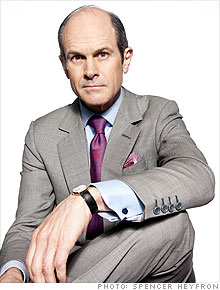Search News
FORTUNE -- Everybody loves a fight. So I'm delighted that we're about to witness a heavyweight title bout between two of the most important ideas that can shape our material lives. The vital question: What's the best way to grow after a bad recession? We in the U.S. are betting heavily on one popular strategy, while Britain and the Euro zone are backing exactly the opposite approach. Rarely do we see such stark conflict in fundamental economic policies on a mammoth scale. The results of this natural experiment will be highly valuable because they'll teach us so much. But they will also be very bad news for one side or the other.
The New World approach, billed as Keynesian, is for the government to pour hundreds of billions of borrowed dollars into the economy to stimulate demand. Companies will hire more, consumers will spend more, and the wheels will resume turning. Then, in future years, the government can reduce the big deficits it has created. As icing on the cake, that stimulus spending can be focused on infrastructure improvements that will make the nation more competitive for decades to come. That's why the U.S. has run trillion-dollar deficits for two years in a row, and why the administration wants still more stimulus spending.

The Old World approach, called "consolidation" by its proponents, holds that people are far likelier to spend and invest in a country that's working to reduce its deficit right now, even though near-term growth may be slow or non-existent. They figure such a country is less apt to raise future taxes or to inflate its currency to ease the pain of repaying debt. That's why 35 of Britain's top business leaders recently endorsed British Prime Minister David Cameron's plan to abolish 192 government agencies and cut the budgets of major departments by 20% to 25%. "Addressing the debt problem in a decisive way will improve business," they say in an open letter. European Central Bank president Jean-Claude Trichet, consolidation's staunchest advocate, says it's good "not because it is an elementary recommendation to care for your sons and daughters, but because it is good for confidence, consumption, and investment today."
In theory, the New World policy makes some sense when the economy is still fragile, as America's is. But it cannot work in practice for at least three reasons.
I fear that one result of the U.S. strategy will be little faith in America's fiscal future. Just as confidence begets more confidence, lack of it becomes a vicious cycle. As people lose confidence in a country's financial strength, they take their investments and innovations elsewhere, worsening the country's plight, driving more business away, and so on. New figures show that as U.S. companies earn impressive profits, they're stockpiling cash rather than building new U.S. operations or hiring more U.S. workers.
The opposing sides in this battle have a tough time debating each other because they have deeply different views of human nature. The New World approach regards people more as economic beings whose macro-behavior can be described with equations. The Old World approach regards people more as psychological beings whose individual behavior can be understood but not easily charted.
When we have a winner, the losing side will rationalize the results, saying they don't prove much, because the two situations were different going in, and that with a little bit of tweaking, their strategy would have prevailed. We should resolve to cut through the inevitable spin and declare a winner. Whatever the results, I'll embrace them. But I think I know how this will turn out, and it won't be good news for America ![]()






| Company | Price | Change | % Change |
|---|---|---|---|
| Ford Motor Co | 8.29 | 0.05 | 0.61% |
| Advanced Micro Devic... | 54.59 | 0.70 | 1.30% |
| Cisco Systems Inc | 47.49 | -2.44 | -4.89% |
| General Electric Co | 13.00 | -0.16 | -1.22% |
| Kraft Heinz Co | 27.84 | -2.20 | -7.32% |
| Index | Last | Change | % Change |
|---|---|---|---|
| Dow | 32,627.97 | -234.33 | -0.71% |
| Nasdaq | 13,215.24 | 99.07 | 0.76% |
| S&P 500 | 3,913.10 | -2.36 | -0.06% |
| Treasuries | 1.73 | 0.00 | 0.12% |
|
Bankrupt toy retailer tells bankruptcy court it is looking at possibly reviving the Toys 'R' Us and Babies 'R' Us brands. More |
Land O'Lakes CEO Beth Ford charts her career path, from her first job to becoming the first openly gay CEO at a Fortune 500 company in an interview with CNN's Boss Files. More |
Honda and General Motors are creating a new generation of fully autonomous vehicles. More |
In 1998, Ntsiki Biyela won a scholarship to study wine making. Now she's about to launch her own brand. More |
Whether you hedge inflation or look for a return that outpaces inflation, here's how to prepare. More |